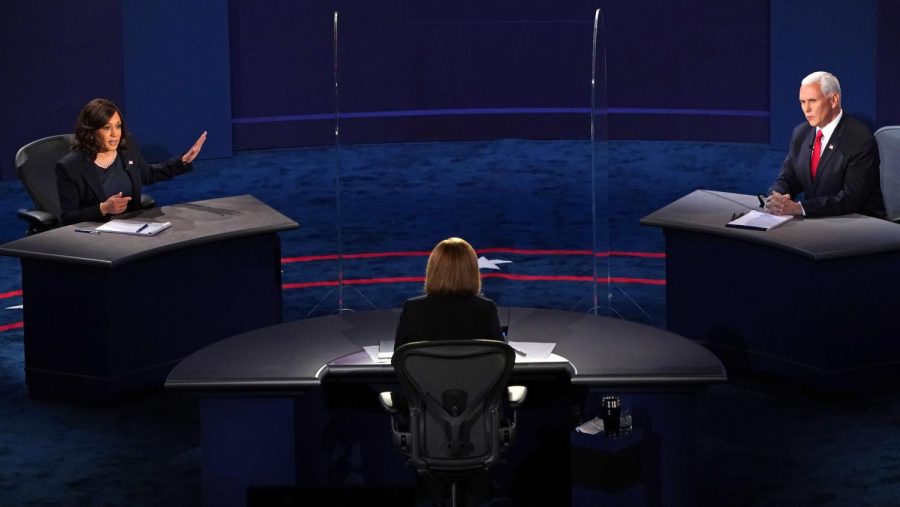This past Wednesday, vice president Mike Pence and California Senator Kamala Harris faced off in the only VP debate before the general election this November.
Moderated by USA Today’s Susan Page at the University of Utah, the two candidates discussed both domestic and foreign policy issues in what proved to be a much more civil discussion than the Presidential debate a week earlier.
Compared to the first presidential debate, the VP debate was “by far more professional and easier to follow,” wrote Maxwell Hook ’23 of the College Republicans in an email.
“Overall, they are better-skilled politicians,” he added.
Charlie Brownstein ‘21 of the College Democrats agreed, but criticized Pence’s demeanor.
“Compared to the Presidential Debate it was much better. Vice President Pence was quite disrespectful at points, continuously going over his time, interrupting Senator Harris and speaking over the moderator,” she wrote in an email.
The first question of the debate concerned the Trump administration’s response to COVID-19. While Harris attacked the administration’s lack of transparency regarding the severity of the virus and stated she would not take a vaccine solely because Donald Trump “tells me to,” Pence focused on the president’s decision to end travel from China and emphasized his trust in the American people to take the information from public health officials and use it accordingly.
The debate then changed into a discussion about energy and the economy. Pence, who stated that the “American comeback is on the ballot,” touted the Trump tax cuts for creating jobs and the administration’s “unleashing of American energy.” Harris rejected the tax cuts for only helping the wealthy and remained committed to green energy, but denied her campaign’s support for the Green New Deal.
“In terms of the Green New Deal, it’s pretty apparent that [the Biden-Harris] policy is similar with a few differences such as no ban on fracking,” wrote Brownstein. “I wish they were in favor of the Green New Deal, but they aren’t. I think that has been made clear.”
“I found the fracking topic to be impactful. Considering Biden’s remarks in PA [concerning his lack of support for fracking], I found Harris’ claim [that he will not ban it] to be untrustworthy,” Hook wrote.
Both candidates evaded some of Page’s questions. Considering that the next president to step into the Oval Office will be the oldest in the nation’s history amid a global pandemic, Trump at 74 and Biden at 78, neither Pence nor Harris addressed under which conditions they would be comfortable taking over in case of presidential disability. Harris similarly evaded Page and Pence’s questions about packing the Supreme Court, while the current VP neglected to address the future of Roe v. Wade and abortion rights or the specifics of the Trump administration’s plan for replacing the Affordable Care Act.
“It is not satisfying — from an informational or entertainment perspective — to see candidates completely ignore direct questions,” Andrew Clarke, professor of Government and Law, wrote in an email. “Still, voters have a lot of information at their disposal if they want to know the Democratic or Republican positions on these issues, broadly speaking.”
While other pressing topics like foreign policy, the Supreme Court, and the integrity of the election were discussed, most doubt that the debate will have any meaningful impact on the election.
“VP debates are largely non-impactful and I do not think this one will be any different,” Brownstein wrote. “I think that the fact the fly received more attention than either candidate is telling as to how small of an impact this debate will have.”























































































































